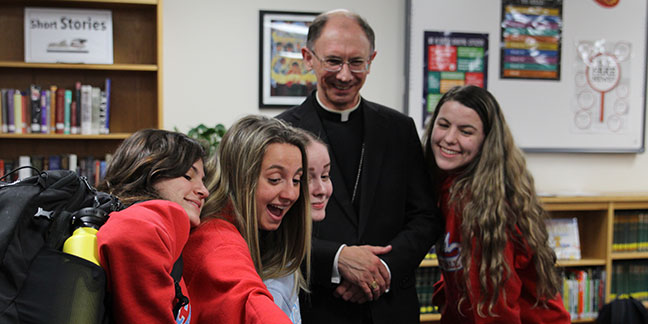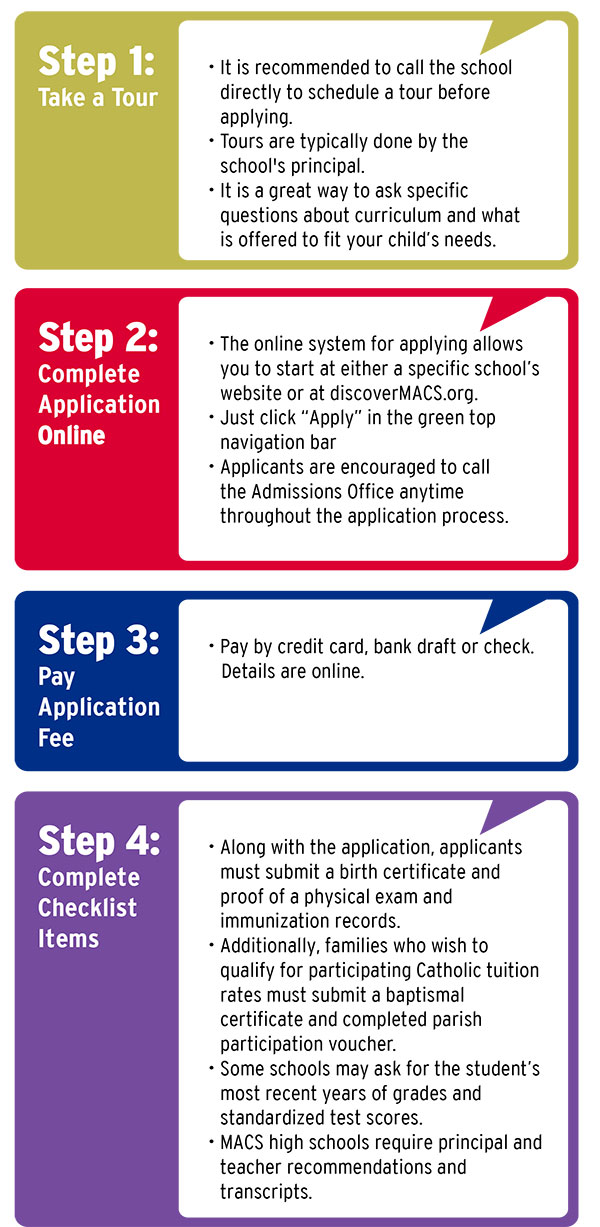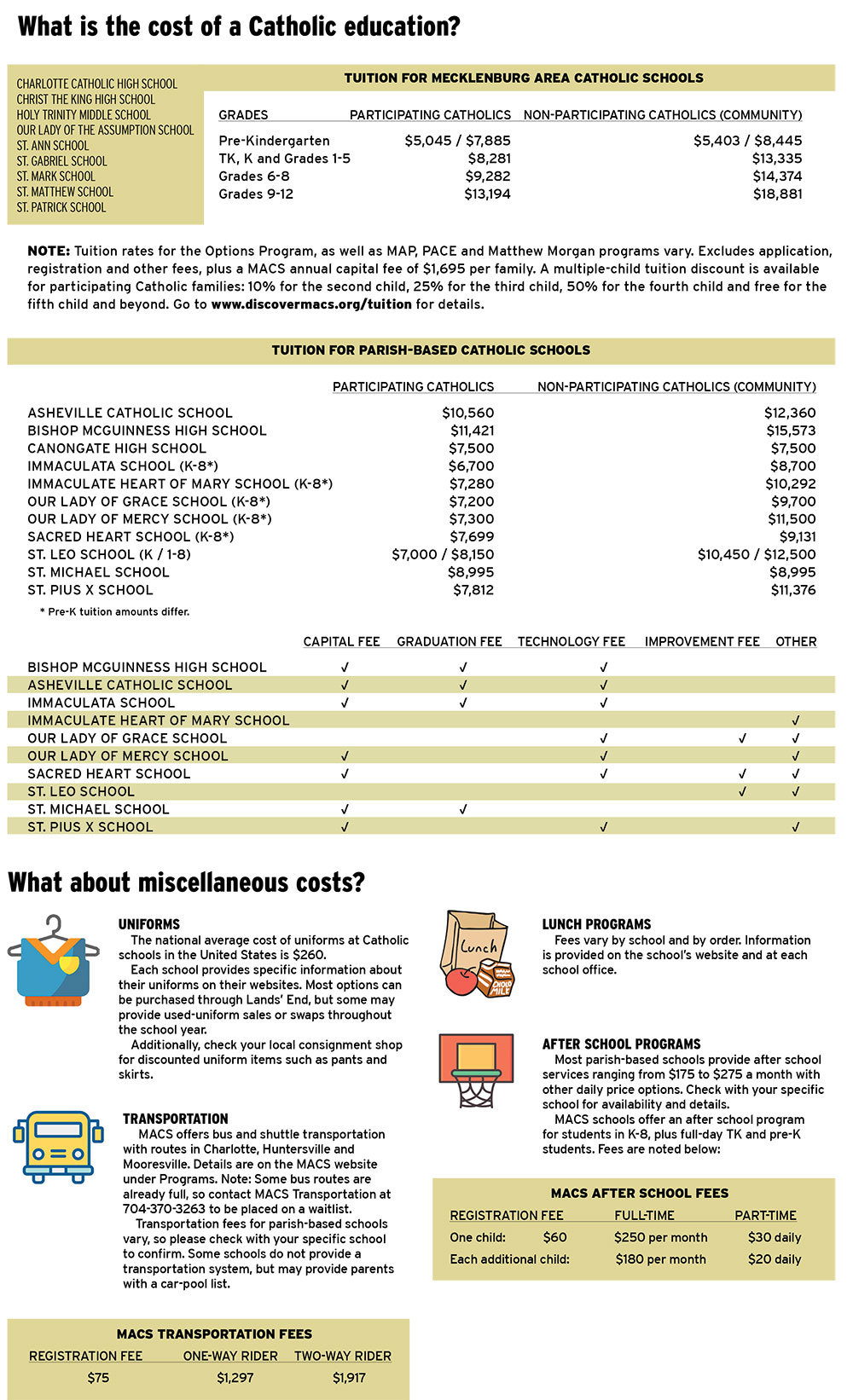 Students at Charlotte Catholic High School take selfies with Bishop Peter Jugis during his visit to the campus for Catholic Schools Week in February 2020 – just weeks before the COVID-19 pandemic hit. (File photo)Parents invest a great deal in providing their children with an education.
Students at Charlotte Catholic High School take selfies with Bishop Peter Jugis during his visit to the campus for Catholic Schools Week in February 2020 – just weeks before the COVID-19 pandemic hit. (File photo)Parents invest a great deal in providing their children with an education.
From driving back and forth, to packing lunches and helping with math homework that seems much more challenging than it should be, at times it may feel as if parents themselves are back in school.
Add in the cost of tuition and miscellaneous fees, and the goal of providing your child with a Catholic education suddenly appears difficult to achieve. However, there is so much more than simply math homework and book reports tied into the value of a Catholic education.
In fact, former St. Mark School parent Theresa Lister says the cost of a Catholic education is “well worth it” for the contribution it makes in grounding children in their Catholic faith. She adds that a Catholic education is “the best of all worlds – combining faith, community and education.”
When you send your child to any of the nine Mecklenburg Area Catholic Schools (MACS) or any of the 10 parish-based schools in western North Carolina, you provide your child with a well-rounded Catholic education that works to cultivate their faith, volunteerism and creativity.
What sets a Catholic education apart from anything else? Along with the other 18 principals in the diocesan school system, Tyler Kulp, principal of Our Lady of the Assumption School in Charlotte, emphasizes that it is prayer and incorporating the Catholic faith into everything done as a school community.
“It is so important that we encompass it with everything. We pray every day – it’s the first thing we do every morning. As a school, we start the day with a daily reading and continue this prayer throughout the day. It is so important to include prayer in everything we do,” Kulp notes.
Along with prayer, students work to serve their communities, living beyond themselves by giving to others and connecting with people who may have lives very different from their own.
As Kulp puts it, “It’s so important for our kids to go out and serve our community. They come back on fire from seeing that they were doing something good.”
When you provide your child with a Catholic education, you start them on the right path to being active members in their community.
In a world deprived of compassion, our Catholic schools cultivate talented, compassionate and successful members of society.
Kulp adds, “What we strive for is getting kids on the path of salvation.”
All three of the diocese’s high schools have a college counseling department and counselors who guide students through the college search, application and financial aid processes. Last year, graduates from the three high schools were awarded a combined $47 million in college scholarships and grants.
Students have committed to play a variety of collegiate sports, including football, swimming, tennis and soccer, at different universities across the country.
Michael Carano, a 2020 Charlotte Catholic High School graduate and rising senior at the University of Oklahoma, notes, “I enjoyed my time at Charlotte Catholic and am grateful for the friendships made. But mostly I can now appreciate the exceptional education I received, as I was extremely prepared for my college courses and workload. The study habits instilled and the foundation made to learn and grow were amazing.”
— Catholic News Herald
By the numbers
100 percent of graduates of Bishop McGuinness, Charlotte Catholic and Christ the King high schools continue on to higher education.
Scholarships awarded last year:
Bishop McGuinness: $11.5 million
Charlotte Catholic: Nearly $26.5 million
Christ the King: $9.1 million
Did you know?
The Diocese of Charlotte Schools welcome students of all backgrounds, even as most students are Catholic and the school system strives to impart the beliefs and values of the Catholic Church.
Catholic: 85%
Non-Catholic: 15%
Each school’s demographic profile varies according to its local community. Systemwide, the student population encompasses people of all races and ethnicities:
ETHNICITY
Hispanic: 14%
Non-Hispanic: 86%
RACE
Asian: 3.6%
Black: 3.0%
Caucasian: 83.8%
Hawaiian-Pacific Islander: 0.2%
Multi-race: 6.1%
Native American: 0.3%
Unknown: 3.0%
How do I apply?
 Navigating the application process for the diocese’s parish-based schools and for the Mecklenburg Area Catholic Schools system (MACS) is a straightforward online process.
Navigating the application process for the diocese’s parish-based schools and for the Mecklenburg Area Catholic Schools system (MACS) is a straightforward online process.
The admissions process begins with early admissions in January and general admissions begin in March, continuing as space is available. All schools work on a rolling admissions basis until all spots are full.
All students entering pre-kindergarten must be 4 years old on or before Aug. 31. All kindergarten students must be 5 years old on or before Aug. 31.
Details for MACS – including required documents and placement testing information – can be found online at www.www.discovermacs.org/apply. Details for each parish-based school can be found on their respective website.
Questions? Call the individual school or the MACS Office any time in the application process at 704-370-3273.
All MACS work on rolling admissions until all spots are full. Additionally, each school offers a multiple child discount for participating Catholic families. Families are encouraged to apply as soon as the application opens for the next school year.
Following their motto “Start with Us, Stay with Us,” once a child is accepted into MACS he or she receives automatic acceptance into the next grade level (i.e., fifth graders do not need to re-apply to a MACS middle school, eighth-graders do not need to reapply to a MACS high school).
Questions? Call the MACS office any time in the application process at 704-370-3273.
Financial aid makes Catholic education more accessible
Most families who attend Catholic schools receive some form of financial aid through tuition discounts or assistance. All of the diocese’s schools offer some sort of tuition discount or subsidy for registered participating Catholic families, up to 30 percent in some cases. Generally speaking, tuition amounts range from approximately $5,000 to $13,000 for registered Catholics, with non-participating Catholics and non-Catholics paying higher amounts. Multiple child discounts are also available.
Needs-based tuition assistance is also available to qualified families – making Catholic education more affordable than ever for more families.
The application period is January through March 31, for the upcoming school year.
A family does not have to be registered as a participating Catholic to receive aid. Aid is need-based and can only assist with the cost of tuition. As soon the application process is complete, families are eligible to receive an award.
For details about the MACS tuition assistance program, call 704-370-3273 or go online to www.discovermacs.org/financialaid.
The diocese’s nine parish-based schools and Bishop McGuinness High School offer similar need-based tuition assistance to qualified students. Details can be found on each school’s website.
All financial aid requests are processed through a third-party processor, FACTS. Most diocesan parish-based schools provide financial aid through the FACTS processor as well. Receiving financial aid requires an ample amount of documentation, which is verified through the FACTS processor using the information provided by the family.
Families are required to apply every year if they wish to continue receiving financial aid. However, applying for financial aid does not guarantee a family will receive aid.
State financial aid available
Other financial aid options include the North Carolina Opportunity Scholarship Program, Disabilities Grant Program, and Education Savings Accounts. These programs (listed below) cover tuition and required fees at a participating non-public school. In addition, the Disabilities Grant and Education Savings Account can cover certain other expenses related to educating a child with a disability.
Opportunity Scholarship Program
The Opportunity Scholarship Program expands school choice in North Carolina through scholarship grants for eligible children in kindergarten through 12th grade. This program provides funding of up to $6,492 per year for eligible children who choose to attend a participating non-public school.
Disabilities Grant Program
The Disabilities Grant Program is a program for eligible students with disabilities in kindergarten through 12th grade to provide an option for parents to pay tuition, fees and some other expenses at a participating school. This program provides funding of up to $8,000 per year for eligible children who choose to attend a participating non-public school.
Education Savings Account
An Education Savings Account expands school choice for eligible students with disabilities in kindergarten through 12th grade. An Education Savings Account is for students attending a registered non-public school and can be applied to tuition and required fees and certain other expenses related to educating a child with a disability. Additionally, it allows parents quarterly access to funds on a debit card. This program currently provides funding of up to $9,000 per year for eligible children who choose to attend a participating non-public school. Each program has specific additional requirements for eligibility.
For details, go to the N.C. State Education Assistance Authority’s website at www.ncseaa.edu/k12.



